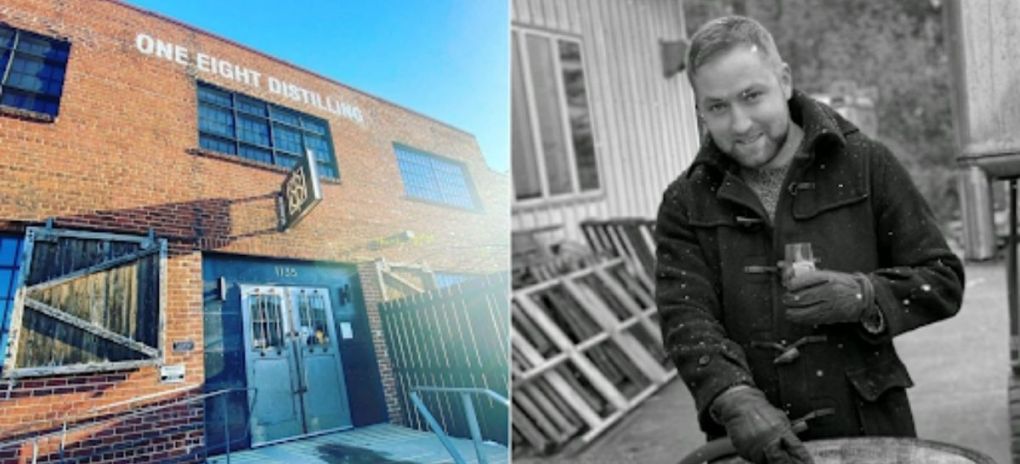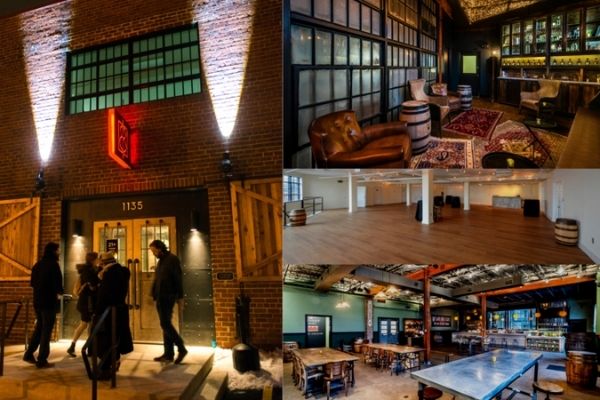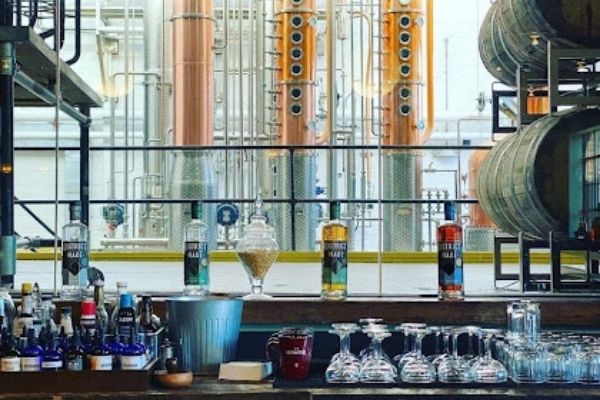
12/09/2022 Take a look through the perspective of a young distiller in the American Craft Distillation industry. The Distiller at One Eight Distilling, Austin Keeton shares his views on his experience as a distiller.
Austin Keeton is the Distiller at One Eight Distilling, a craft distillery producing some of the finest grain-to-glass spirits from locally sourced ingredients from the mid-Atlantic. It is named after Article One Section Eight of the Constitution, connecting to the history and tradition of the country by producing bold flavors from high-quality locally sourced ingredients. Austin began his journey while training with the Taiwan Army, where he found his love for fine whiskies. His short but exciting career in distilling started with Blaum Bros Distilling Co. and now he is the Distiller at One Eight Distilling, where he is exploring his passion for fine spirits.
[[relatedPurchasesItems-31]]
Tell us a little about yourself? What inspired you to join the beverage distillation industry?
My distilling career is still very much taking off, but it's given me a valuable perspective from working at more than one distillery with accomplished head distillers and blenders (Blaum Bros in Galena, IL and One Eight / District Made in Washington DC). Like most people that end up in the craft spirits world, my background has been a strange game of hopscotch. I graduated from West Point in 2013 and served in the Army doing logistical work for five years. I grew to admire whiskey while I was a guest officer in the Taiwan Army brushing up on my Mandarin. I was introduced to Kavalan by the Taiwanese officers and knew this was what I wanted to be around. I started whiskey clubs while serving in Alaska in 2015 and explored soju while living in Korea in 2017. After I left the military, I volunteered on farms and ranches around the world for a year, and while ranching in Iceland, I tried to make a whiskey connection through a class of '78 West Point graduate, Dave Pickerell. This was December of 2018, and, as many know, I was a month too late. I took a pilgrimage of sorts in Scotland over four months, visiting Islay, Jura, Skye, Arran, and numerous spots in the Highlands. I tried my hand in the corporate world and joined an excellent whiskey club in Naples, Florida in 2019. It consisted of lawyers, wealth managers, and Canadian retirees. They only brought the best bottles to meetings. It was during one of those meetings, over a presentation of Highland Park: Helluland, that I realized I wanted to be a maker of these beautiful things we were enjoying. So I quit my job that made good money and spent half of 2020 bothering every distillery in the country until I got an assistant distiller role at Blaum Bros in Galena, Illinois. Mike Blaum called me up and asked "so what's a West Pointer doing wanting to make whiskey?" and I spent over a year there learning from some of the smartest people I've ever met. Mike taught me how to blend bourbon and rye whiskeys and I quickly discovered that this form of art was what I wanted to pursue. Eventually, my friends and classmates started convincing me to get out east in late 2021 to be around them and the startup networks they had begun cultivating so I jumped on an opening. Now I'm honing my skills at One Eight Distilling Co in Washington DC.
Being the Distiller at One Eight Distilling, what does your day look like
I swap between early and normal days every other week with the head of the production, Stephen Corrigan. The early shifts are the most important. I come in around 6 am, start up the facility with compressed air, get the steam going on the still and water filling for a mash run. The still is going to take a bit, so I concentrate on the mash (vodka, rye, bourbon) and get set up to mill the designated grain and prepare the yeast and chemicals. The still starts producing the spirit after a few hours, and I'll monitor the taste to determine when it's time to cut from our heads cut to our hearts cut. Every distiller has a different opinion on when the cut should be made. I tend to let some acetaldehyde notes go into the main cut. I'm fortunate to work on a still that can automate some of its functions, giving me time to taste some barrel samples that will become the next batch of bourbon or rye whiskey. On a good day, distillation and mashing end around 4/4:30 and it's time to close up and ensure everything is prepared for tomorrow.
According to you, what makes a spirit great? Where do you draw inspiration from while making new spirits?
I guess it can be subjective for what makes a spirit great, but I feel there are a few overall qualities that matter most. Superior ingredients are key and I think most people will agree with me. You cannot cheat your way through the process, and poor grain will not be fixed with aging, just as a good spirit will not become a good aged product using poor barrels/vessels. I've had a few distillers tell me "garbage in, garbage out". Next, attention to detail is of the utmost importance. By that, I don't just mean your spirit ratios or measurements, but also when you make your head and heart cuts, your fermentation times, boiling lengths, etc. I've unfortunately learned the hard way how a mistake in this area can affect your final product. Lastly, I'd say art. I mean the part you can't truly convey with hard facts. Art is anything that moves you, and I've had spirits that move me. Maybe a particular single barrel or blend was simply beyond words. This is where it can get very subjective, but I like to think it's still very possible to convey that feeling to the consumer.

One Eight Distillery interior; Source: One Eight Distilling
What role do you think Distributors and retailers play in the development of a new spirit? How do you think they can help you to increase sales and how can you work with them to innovate and expand?
Retailers, producers, and distributors tend to bump heads every now and then, but when they work well together, I've seen some great product development/advocacy come out of it. Barrel picks via liquor stores are still one of my favorite ways to engage with the community and showcase some special profiles that would otherwise be unreleased via normal channels. Having a good relationship with your distributors can also drive brand awareness as well as pick the right distributor. It's no secret that you may not get as much advocacy if you are part of a portfolio that includes only the biggest brands
Can you take us through your product line? What makes your spirits unique?
Our flagship spirits are Vodka, Gin, Barrel Rested Gin, Bourbon, Rye, and our Untitled line. The vodka is made completely from scratch and is rye-based. This takes some time, as some distillers understand all too well, but the end product is one of the best vodkas I've ever had. It's clean and rich with creamy undertones, as well as very affordable. The gin is made on a smaller, separate still, and consists of a unique botanical blend through basket distillation. It has a crisp, lightly floral body without being too piney upfront. The barrel-rested version is the same blend of botanicals but with the addition of orange peel and time in the barrel, augmenting it with some ex-bourbon notes that marry up quite nicely with the gin base. Our bourbon is actually aged as separate mash bills before being blended, meaning the high-rye quantity and the wheated quantity are aged apart before blending. This lets us monitor flavor notes we want to stand out in the final product. I'm a bit of a rye guy, so that's where I tend to have the most fun. The grain we use in both the rye and bourbon is sourced from local farms, giving us a great deal of quality assurance and control, as well as getting to know the actual individuals that contribute to the whole process. Finally, our Untitled line is a finished blend of our original sourced stock that varies from batch to batch. We've seen a lot of popularity with these batches since they offer something different every release. Our annual releases/one-offs like Bottle in Bond or Cask Strength offerings are incredible but limited.
What are some of the recent upgrades and innovations in terms of technology in the distillery? What do you think are some of the upcoming innovative Spirits trends in the market?
It was before my time, but the installation of a beautiful 2000L double column still has greatly increased efficiency along with our heat exchange system that allows us to cool our mash at a higher rate. Both of these installations allow us to both mash and distill more than we were previously able to. It's difficult to say where things are trending in the spirits market. I've seen distilleries that prefer extremely tall, single-column stills, yet I've even seen a distillery in Texas that shipped in a truly massive pot still from Scotland. As sourced whiskey costs more and more to procure for craft distilleries starting up, I think we may see a change in where/how startups source their initial juice, or may even pivot to less age-intensive products.
How do you focus on sustainability while making your spirits?
Sustainability has been getting increasingly important in the spirits industry. At a craft level, we do as much as possible to properly recycle or convert spent products to something that is still of use. While we can't replenish oyster reefs for ocean sustainability like some big distilleries in Scotland can, we can at least ensure we properly dispose of what we cannot use or give them away to someone in need (hand sanitizer is a big one).
What major challenges do you happen to face while distilling your spirits? What is the one tip you would like to give someone who is looking forward to joining the beverage distillation industry?
Lack of knowledge and experience and the anxiety that comes with it. Going from a completely different background into distilling and blending in my first week really put some doubts into me. That changed after a few months and I continued to learn the finer points during my first year of distilling. All of that changed again when I moved to DC with new equipment, new processes, new everything. It's a challenge because you quickly realize what a massive absence of knowledge you have and it can be overwhelming at first, but once you accept that you're a work in progress and there are many people in the industry to help you, it gets much better. You look at some of these people that write books on cask management and distillation and it can be a bit intimidating. Be curious. Reach out to those you admire. Ask dumb questions. Shadow experts. Explore what aspects you think you'd be good at. Maybe you're a blender at heart or a brand ambassador. Don't stop exploring. I'm always reaching out to people in the industry I admire and asking questions because there is so much to learn and so many connections to make. I'm still learning who I want to be in this industry.
How do you think a distiller can help in driving marketing and sales personally?
In my opinion, advocating for your own product personally is pretty much necessary at all levels, but especially on the craft side. It's not always possible to hire ambassadors or have people representing your product, so you have to be the face at times. That's what I've seen so far in my short journey, but customers really do love getting that level of interaction. The owner at One Eight, Alex Laufer, will host tastings and join local podcasts in the area to get the word out. Matt and Mike at Blaum Bros even put themselves on the bottle. Pretty smart move, actually.

Distillery view bar at One Eight Distilling; Source: Instagram / One Eight Distilling
How do you think the American Craft Distilling industry has evolved with time? Where do you see it in the next five years?
It isn't the 80s and 90s anymore. We have more than four or five brands to pick from. There is no secret recipe you found in your grandfather's attic. Maybe. Customers are on an entirely new spectrum of product awareness for the most part. They ask questions that sometimes I can't answer on the spot. I have friends outside of whiskey that knows more about bourbon portfolios than I do. I love it. It means things are changing on a cultural level. The post-prohibition era produced laws in regulation that made sense then, and now we are all watching as states inevitably give way to new alcohol laws that make sense now. Alcoholic Beverage Control (ABC) laws will change or be repealed in this century and that creates opportunities for growth and innovation. Virginia, one of the harder states to start a distillery in, could see major growth if state control laws go away in the next decade. However, pair that with the rising cost of sourced whiskey for craft operations, and we may see some consolidation in the next five years through buying smaller distilleries for their stock rather than the larger producers. Also, we're seeing a move towards older strains of rye that had so much flavor to offer but were phased out in favor of strains that provided higher yields. Some of that thinking has to do with cross-pollination, but certain distilleries are buying land and even islands to bring back some of these amazing flavors.
What do you think are the three essential characteristics of a good distiller?
Fixated on detail. Fun. Open. Collaborative. And a good production playlist (this is key).
Finally, which are some of your favorite cocktails?
A straight rye whiskey, preferably 100p at least, and in a nice chair with friends around me or reading alone. Maybe an Armagnac. I'm very easy to please with cocktails. A nice Gimlet or Manhattan suits me just fine.
Header image source: Instagram / One Eight Distilling
Interviewed by Prithvi Nagpal, Editor & Sommelier, Beverage Trade Network



